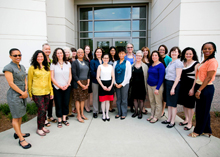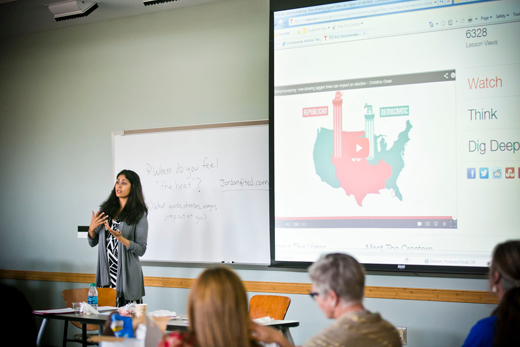On a recent Friday in May, Emory faculty from across the university met for the third convening of the Public Voices Thought Leadership Fellowship, a collaboration between Emory University and The OpEd Project.
The fellows greeted each other with hugs and pats on the back while chatting enthusiastically about recent accomplishments. Nine months ago, few of them had ever met. Now they were a cohort — compatriots in the quest to translate their research into op-eds and other forms of scholarship presented to and accessible by the public.
An op-ed is an opinion piece or commentary published in a mainstream media outlet. The transition from scholar to public thought leader isn’t always easy. Writing for mainstream media outlets requires a different mindset and style than writing for one’s colleagues. Even the preferred sentence structure is different — shorter, punchier.
The timeline for turning an idea into a publishable piece and submitting it to the right venue is a matter of days, sometimes hours. Rejections may come in a form letter – if they come at all. Feedback from editors is minimal at best. Commentary on a piece published online is instantaneous and can be brutal.
The Public Voices Fellowship provides support as well as training for scholars making this transition. Through a quarterly series of daylong workshops, fellows are coached on articulating their expertise and pitching their ideas to the appropriate venue.
"The root problem is not a lack of knowledge or experience," explains Katie Orenstein, founder and CEO of The OpEd Project, "but a culture in which minority voices (especially women) rarely have the inside information, high-level support and inside connections to become influential on a large scale."
Fellows learn to think bigger about the value and potential impact of their expertise.
How it works

Public Voices Fellows
Throughout the first year of the fellowship, dedicated mentor-editors from The OpEd Project check in weekly with tips on news stories and possible leads. These same mentor-editors work one-on-one with fellows on their drafts and their initial pitches. Fellows keep in touch via email and in person to support each other through the psychological challenges of speaking out.
"The OpEd Project has provided a sophisticated support structure to our development as public scholars," says Goodrich C. White Professor of Anthropology Peggy Barlett, a Public Voices Fellow. "I am grateful to be involved and have found the process deeply thought-provoking as it encourages us toward a new level of engagement and visibility."
The OpEd Project began in 2008 as a nonprofit dedicated to increasing the number of female and minority voices in the public sphere by training experts to write op-eds. Research in 2005 revealed that 84 percent of op-eds in the New York Times, Wall Street Journal, and Los Angeles Times were written by men. (See The OpEd Project 2012 Byline Report.)
Thanks to the efforts of The OpEd Project, those numbers are changing. The seeds of the current partnership were planted in early 2011, when Rylee Sommers-Flanagan, a senior in Emory College, suggested to the Center for Women (CWE) that Emory could benefit from bringing The OpEd Project to campus.
The organization's mission fit with the CWE’s interest in opportunities to connect academic scholarship to "real world" women’s issues and in leadership development opportunities for female faculty. So CWE brought the nonprofit to campus for a two-day workshop.
Getting on a five-year track
The OpEd Project had recently begun piloting a multi-year fellowship program for faculty at universities, including Stanford and Yale, and they immediately expressed interest in making Emory their institutional flagship partner in the South.
According to Orenstein, "The goal of the Public Voices Thought Leadership Project is to dramatically increase the influence of women and minority thought leaders and to ensure their ideas shape the important conversations of our age."
When enthusiastic alumni of that first two-day workshop wrote letters clamoring for a longer-term partnership, the CWE and the Center for Faculty Development and Excellence (CFDE) decided to make the Public Voices Thought Leadership Fellowship the first step of a five-year Public Scholarship Initiative.
Nine months into the two-year fellowship, the 20 scholars in the first cohort have had over 55 media placements, far exceeding original expectations. Benefits of public scholarship include opportunities for expert research to reach policy makers who are in a relaxed and inquisitive state of mind reading their morning blogs or papers or watching the nightly news.
Dan Rather Reports recently interviewed Tressie McMillan-Cottom, the only graduate student in the cohort, for a segment on for-profit colleges airing June 4 at 8 p.m.
"Sociology is inherently public. We draw on the lives and experiences of people for our scholarship," says McMillan-Cottom. "It is important to me that the benefit of that symbiotic relationship not flow in one direction, which is usually up and out of the communities we study. Public scholarship and interviews like the one I did with Dan Rather Reports give me the opportunity to give that scholarship back to the larger community."
Getting the word out
As anticipated in the five-year plan, the fellows are also having a material effect on the Emory community. They regularly speak at public scholarship workshops co-sponsored by the CWE and CFDE, sharing their experiences with other faculty and graduate students and spreading the public scholarship bug.
Public Voices Fellow Debra Houry says, "The Public Voices fellowship changed my mindset and showed me the importance of public scholarship. The op-eds I've published received more feedback and public responses than most of my scholarly papers."
Houry, who is the director of the Emory Center for Injury Control, even assigned students to write op-eds in her University Course on "Violence: A Multidisciplinary Inquiry." Rosalyn Schroeder, a master's candidate in public health who was enrolled in the course, subsequently published her op-ed in The Huffington Post.
"Our center (Emory Center for Injury Control) is proud to co-sponsor the next cohort of the fellowship," says Houry. "We plan to encourage our faculty to consider publishing in op-eds and other public venues. We are also sponsoring a social media lecture series now, too, to promote knowledge in this area."
Associate Vice Provost for Community and Diversity and CWE Director Dona Yarbrough estimates the public scholarship initiative as a whole will ultimately touch at least 500 scholars, including undergraduates, graduate and professional students, and faculty.
"This initiative benefits faculty by increasing their influence and reach, benefits Emory by showcasing our world-class scholars, and benefits society by increasing both the level of expertise and the diversity of voices in the public realm," says Yarbrough.
"In a cultural climate where the continued relevance of higher education is itself a topic of public debate, we need to make sure our diverse Emory voices are visibly contributing to the public good." This is what creating community and engaging society is all about, she adds.

